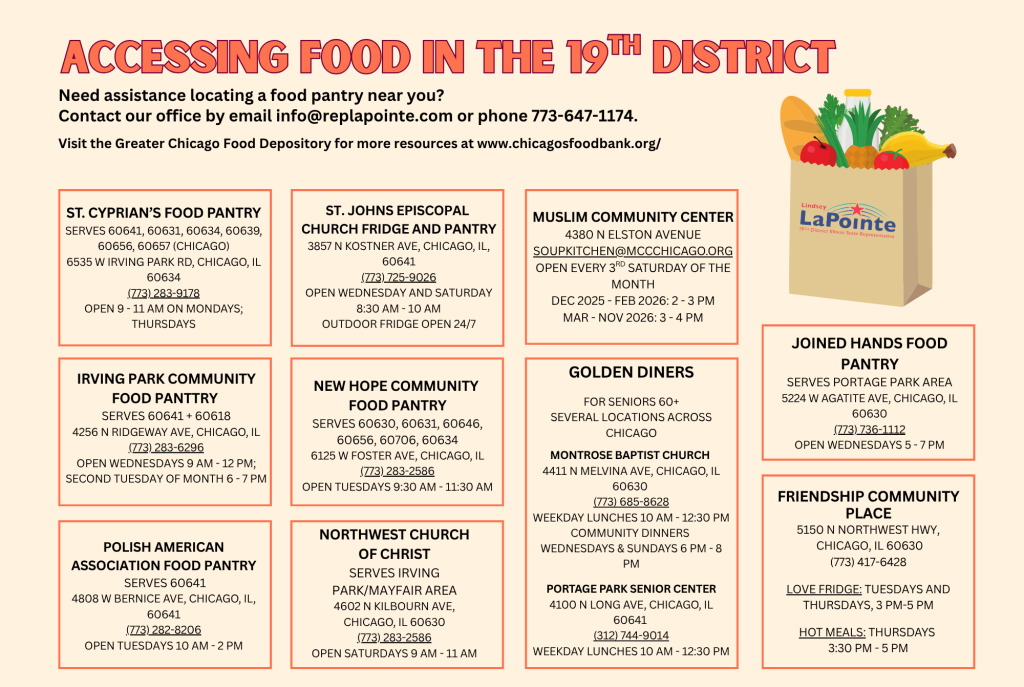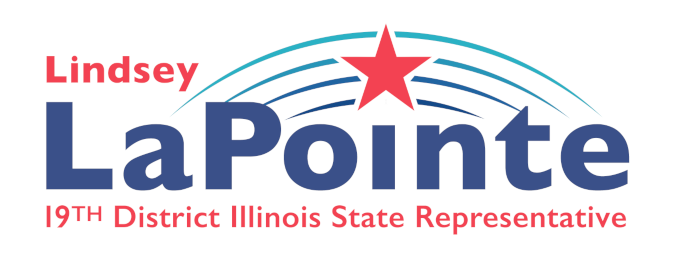Community Resources
Resources for Basic Needs
Food Pantries & Hot Meals
We know that many far NWS neighbors live paycheck to paycheck, which can make affording basic needs like food difficult. Unfortunately, the task of finding resources that mitigate food insecurity can often be difficult and overwhelming. Our office compiled a list of all local far NWS food pantries and hot meals available on a weekly basis. You can find more information on how to access food, as well as locate pantries across the Chicagoland area at this link: https://www.chicagosfoodbank.org/

Seniors
IL Long-Term Care Ombudsman
Nursing home residents have the right to quality, person-centered care, but too often, residents find themselves in situations where their rights are being violated and their needs are not being met. It is important to know the steps you can take to advocate for yourself when this happens. If things go wrong, there are specific actions you can and should take to try and change the situation within your facility. There are also ways to advocate for change on a broader level outside of your facility.
The IL Long-Term Care Ombudsman Program (LTCOP) is a resident-directed advocacy program which protects and improves the quality of life for residents in a variety of long-term care settings. Ombudsmen work to resolve problems of individual residents and to bring about changes at the local, state and national levels to improve care. Learn more about the services they offer by visiting their website.
LTCOP offers Illinois residents access to free webinars on older adult issues, concerns, and much more. You can access their YouTube linked or check out a video below on the 2024 Legislative Session.
Nursing home residents, you have the right to quality, person-centered care. Nursing homes
are required by federal law to provide the care and services you need to reach your highest level
of well-being. Too often residents find themselves in situations where their rights are being
violated and their needs are not being met. It is important to know the steps you can take to
advocate for yourself when this happens. If things go wrong, there are specific actions you can
and should take to try and change the situation within your facility. There are also ways to
advocate for change on a broader level outside of your facility.
Behavioral Heath Resources
NW Side Addiction Recovery and Mental Health Resource Guide
Our office knows that navigating Illinois’ behavioral healthcare system can be challenging for many of our residents, which is why we created this user-friendly guide to help our NW side neighbors through the process. Below, you will find a range of resources that target mental health support and addiction recovery, with updated information every six months. Reach out to our office if you need a copy of your own!Addiction Studies
Wright College offers 5 basic classes with an unpaid practicum in mental health and substance abuse treatment agencies. Successful completion of the program can garner a student a Basic Certificate in Addictions Studies. Credits at the college can then be applied towards taking the CADC (Certified Alcohol and Drug Counselor) exam. Students range from anyone with a high school diploma, associates, master’s or even PhD’s are all welcome! For more information contact Rhays1@ccc.edu or check out this brochure.
Mental Health & Policing – the Present and Future:
People with mental health issues are overrepresented in the criminal justice system and street level police are often the first point of contact. Although we’ve made some strides to respond to mental health issues with treatment in lieu of criminalization (e.g., Crisis Intervention Training for officers – “CIT”, mental health courts, co-responder models, mobile crisis, the Chicago CARES team, etc.), we still have a *long* way to go. From a state policymaker perspective, Representative LaPointe will outline where we are and where we are headed on the journey to enact alternatives to 911 for Illinoisans experiencing mental health crises.
Background of Issue:
- Over representation of people with mental illness in criminal justice system
- About 2 in 5 people who are incarcerated have a history of mental illness, resulting in jails and prisons becoming de-facto mental health facilities.
- People with an autism spectrum disorder are seven times more likely to encounter police than “neurotypical” individuals, or those without developmental disabilities, according to autism experts. Depending on the severity of their disorder, people on the autism spectrum can react inappropriately to police and have trouble following commands.
- Recent examples from the news
- Policies and programs for treatment vs. criminalization
- Law enforcement training (Crisis Intervention Training, autism training)
- Due to state law, all officers complete mandatory training on CIT in the academy, per a recent law. The more comprehensive 40 hour training is voluntary for officers, however.
- CPD mandates the 40 hour training for FTOs, Sgts. and Lts.
- About 39% of all CPD are either certified or trained, ILETSB reports 50% of all officers in Illinois have completed the 40 hour training (certification).
- Law enforcement training (Crisis Intervention Training, autism training)
- As of January 2027, the academy will provide training on autism, per a law passed in the spring of 2024 (SB3201).
- Mental health courts
- The Chief Judge of each judicial circuit may establish a mental health court program, including the format under which it operates under this Act.
- There are 30 Mental Health Courts in Illinois certified by the IL Supreme Court, 7 in Cook Count. 20 of the 25 Judicial Circuits have Mental Health Courts.
- Treatment/medication in jail/prison, etc.,
- Only 3 in 5 people (63%) with a history of mental illness receive mental health treatment while incarcerated in state and federal prisons, and less than half of people (45%) with a history of mental illness receive mental health treatment while held in local jails. Both adequate services and staff are needed, in addition to appropriate identification of detainees and inmates.
Alternatives to traditional 911/policing:
- 988 Suicide & Crisis Lifeline and the three pronged “system”.
- Someone to call, someone to come, and a place to go (not jail, not a hospital).
- Mobile crisis response (MCR) – “someone to come”
- Lutheran Social Services of Illinois in our area. FAQs HERE, Mobile Crisis Team HERE.
- “In our service area, whether you call our local mobile crisis line or 988, you’ll be connected to a trained crisis counselor who can help assess the situation, offer support, connect you to additional community resources if needed, and guide next steps. If needed or wanted, we can send a mobile team—typically a licensed counselor and a peer support specialist—to meet you wherever you are: at home, work, school, or any safe community location. Response time to be on-site is 30-60 minutes. MCR serves kids to older adults, 24/7, with counselors who speak Spanish, Polish, and many other languages. There are no requirements like insurance, ID, or citizenship status. The only thing needed is that the person in crisis is willing to talk with us.”
- “In over 90% of cases, we’re able to de-escalate the situation without needing hospitalization. But if a hospital visit is determined (with your input) to be the next step, our team will support you and your loved ones every step of the way—helping you understand your options, advocate for your needs, and feel less alone in the process.
- If calling 911 is necessary, let the operator know it’s a mental health crisis. You can request that responders arrive without lights and sirens if you think they may cause additional distress. You can always request a CIT trained officer via 911.
- “In our service area, whether you call our local mobile crisis line or 988, you’ll be connected to a trained crisis counselor who can help assess the situation, offer support, connect you to additional community resources if needed, and guide next steps. If needed or wanted, we can send a mobile team—typically a licensed counselor and a peer support specialist—to meet you wherever you are: at home, work, school, or any safe community location. Response time to be on-site is 30-60 minutes. MCR serves kids to older adults, 24/7, with counselors who speak Spanish, Polish, and many other languages. There are no requirements like insurance, ID, or citizenship status. The only thing needed is that the person in crisis is willing to talk with us.”
- Lutheran Social Services of Illinois in our area. FAQs HERE, Mobile Crisis Team HERE.
- Co-responder models
- CARES Team in Chicago – In some police districts, M-F 10.30am to 4pm, NOT in the 16th District. Includes Crisis Clinician, EMT, outreach supplies, vehicle maintenance, and a portion of our 2 supervisors, our 2 case management team staff, and overhead costs.
- $4M annually to maintain current services including teams in 6 districts, city-wide team, 10AM-4PM, M-F
- $7M annually to expand to evenings and weekends in all 6 districts, including coverage for 6 teams, city-wide team
- An estimated $650K to add a new CARE team in a district without a team
Implementation & funding – we are not there yet.
- There is a difference between passing laws and fully implementing and funding them.
- Community Emergency Services and Supports Act
- Co-responder models in state law
- 988 and the the behavioral health crisis continuum
- Funding for the behavioral health crisis continuum, including the 988 telecom fee, in the SFY26 revenue package
- Chicago CARES Team – What would it take to be City wide?
- Public Awareness is critical!
What can YOU do?
- Know the alternatives to 911 in your community today (on the far NWside, it’s LSSI) today. Educate others.
- Educate yourself and others on the next steps and advocate for more progress on alternatives to a 911 response.
- Ask questions and share concerns about what we have today and what we are planning for the future.
Education
Applying for college can be an exciting journey, but it also comes with a significant financial burden. With state funding for public higher education in Illinois on the decline, this issue deserves urgent attention. In the meantime, we’re here to help. Check out our newly released Sponsorship and Financial Aid Resource Guide. While it’s not an exhaustive list, we’ll be updating it at least twice a year to keep it as helpful as possible. Everyone deserves the opportunity to pursue higher education, we hope this guide makes this process a little easier.

